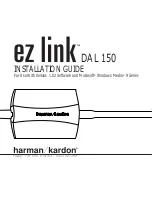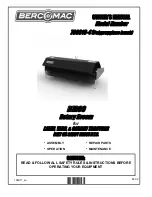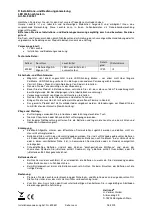
Use of the in-line temperature sensor is recommended when the environment or sample experience
temperature changes. It provides a direct sample temperature measurement to the instrument, that is
not influenced by the ambient temperature.
The in-line temperature sensor connects to an adapter at the rear of the sensor. When connected,
the in-line temperature signal bypasses the internal temperature sensor signal, and is sent to the
measuring instrument via the thermal conductivity sensor cable as usual. When the in-line
temperature sensor is unplugged, the internal temperature sensor is re-activated.
There are a number of different temperature sensors depending on the specific application
requirements.
External pressure sensor
The system can be fitted with an external pressure sensor. This enables a measure of fraction of gas
under variable pressure conditions during gas phase measurement.
Two models are available, depending on applied pressure:
• 28117 Pressure sensor 0 - 5 bar absolute
• 28117C Pressure sensor 0 - 1 bar absolute
C A U T I O N
Do NOT exceed the pressure range of the sensor. This would permanently deform the sensor membrane, thus
delivering incorrect pressure values in the future.
The external sensor connects to the ORBISPHERE measuring equipment with a 1 meter cable and a
4 pin connector (an optional extension cable can be used, but total length should not exceed
50 meters).
The external pressure sensor can be installed in the model 32002.xxx multi parameter flow chamber.
It is held in place by a blue threaded collar. Tightness is assured by the O-ring on the sensor seat.
Maintenance
Maintenance schedule
Service includes membrane replacement and external cleaning to restore the original sensor
sensitivity. This means low running costs and down time reduced to a minimum.
The membrane needs to be replaced once or twice a year depending on application conditions. This
can be tailored accordingly.
Note: If you are not familiar with ORBISPHERE sensor servicing, your Hach Lange representative will be glad to
assist you
Testing the sensor condition
Periodically, inspect visually the sensor head for any deposits. Rinse it under clean tap water, and
dry with a clean tissue.
To verify the sensor, check measurements against a known standard sample value:
• If reading deviation is ±1% of the expected value, no action needs to be taken.
• If deviation exceeds ± 1%, perform a new calibration.
• If deviation exceeds 10% of the original values, replace the membrane.
C A U T I O N
Carry out the maintenance in a clean dry place in order to avoid damaging the sensor's precision components,
and also to prevent water or humidity from getting into the sensor.
English
11
Содержание ORBISPHERE 31 series
Страница 2: ...English 3 Deutsch 14 Italiano 26 Fran ais 37 Espa ol 49 e tina 61 Magyar 72 2...
Страница 83: ......












































